Interview: Geoffrey Williams Talks DROWNED OR SAVED?
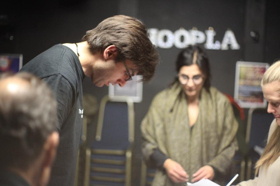
rehearsal for Drowned or Saved?
Playwright Geoffrey Williams pens a new play about the aftermath of the Holocaust in Primo Levi's life. We sat down to discuss the author and what it means to carry the weight of survival.
How did you come to write for the theatre?
It's quite an interesting story, I started out in psychology in South Africa. I was fascinated by people, but I was fascinated by them artistically. I wanted to create, rather than analyse.
Eventually, a lecturer said to me "You need to be doing something creative. You're good at this, but this isn't for you", so without really knowing why, I came to the UK, and as I studied I found myself writing. I like to create, I like to get inside the characters.
Do you regret leaving the medical field?
Not at all, it's the best decision I've ever made in my life. But it's not going to make me wealthy.
How does your background in psychology affect your writing?
I get asked this question every now and then and it's usually not the way people think. I don't come to my work as an analyst. What it does for me is it makes me go deeper inside. A lot of what psychology is... I call training empathy. You have to try to understand the other person even if you really don't agree with them. I found that to be incredibly valuable and to go inside and around the way this person makes those decisions, why they're making those decisions.
The cliché in theatre is that no one is the villain of their own story and you have to keep that in mind when you're doing something. In my play Drowned or Saved? when Primo Levi confronts the so-called villains after World War Two... I spent a lot of time trying to understand these people and their perspectives and why they did what they did.
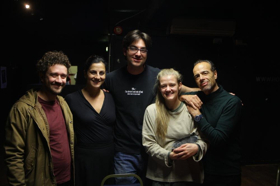
company of Drowned or Saved?
What is your writing process like?
I start with something I feel the need to write about, something that captures my interest and my imagination. I start to flesh out what it is and often I sort of know what the ending is gonna be. I know the idea I'm trying to explore.
I know a lot of writers start somewhere and see where it takes them instead. I know the ending but, for me, I don't know how I'm going to get there usually or what the tools are or if they're going to work.
I found more and more as I've developed the way I write - I kind of just write things down, scenes and whatnot comes to me, ideas that could work, what if I put this person in this situation... What if I bring these two characters together, why should they be together, what would they do, what would they say... And then it becomes very clear. Very quickly it becomes clear what's the right direction and what's the wrong one.
It also forces me to go "What am I trying to write?" because I think that a lot of modern plays suffer from not having clear what they're trying to do. People worry too much about complexity. I think, actually, a simple idea, explored well, in terms of my process, can be easier to grasp than a lot of complex ones together.
How did Drowned or Saved? come about?
As someone with Jewish heritage, there is just a relationship with this specific period in history. An unavoidable kind of stamp on your being. It's still so much part of the consciousness of how we view the world. I'd been reading a lot about [Holocaust] survivors and their accounts of what happened. Most people know the numbers, the six millions, the death count...
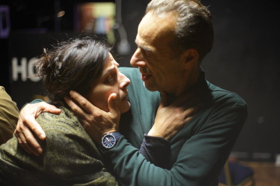
or Saved? in rehearsal
I wanted to know more, so I read Levi and it captured me in ways others didn't. He just had a view of it that absolutely did that. I became fascinated with his life afterwards because then the people had to carry the weight of what happened for the rest of their lives. The play I wrote was looking at that "afterwards".
How do you manage that burden 40 years after? We all carry bits and pieces of our pasts - what if that was Auschwitz? What if you had to carry that? And all you did every day was kind of bear witness to it and talk about it? What is that weight like at the end of your life? Are you ever able to put it down? When you put it down, what does that do to you? That was how I came to write it.
What's the plot of the play?
What is a life spent bearing witness like? To just give you the idea of the play without giving anything away, he's trying to write a story and he creates these characters so he can talk to them. It's about how they interact and take him into another world of memories and fantasies. And then what happens when the real world intrudes and life comes in it. He's getting stuck into his own world and getting pulled out of it.
What kind of research did you do?
My major sources apart from his works - fiction and non-fiction, all that - are the biographies, writings about him, essays... I tried not to make up too much. Obviously I had to create a character for the stage and I want it to be clear that it's fiction. I'm not trying to say I'm putting Levi on stage, but at the same time 90% of it is all true.
When his biographer Ian Thompson came and wanted to know where I found the information in that 10%, I had to say "No, no, I made that up". But to him it felt so true and so like the Levi he interviewed that he could believe it. I feel endorsed in the work because the person who's an expert in Levi believes in it. I feel very proud of that.
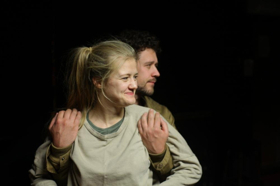
or Saved? in rehearsal
You wrote the prophet Elijah into Levi's life - why this choice?
Levi brings in Elijah... I don't want to give readings of the play because that's up to the audience. Elijah is a Jewish figure and the play is roughly set around the time of Passover, when you leave a seat at the table for Elijah, who represents the coming of the Messiah and a better tomorrow.
When you read Levi's work, his fiction and even some of his non-fiction, he creates people to function in the world. Elijah, he creates to help him understand things. Which is not to say he believes Elijah is real. It's just what Elijah represents that's important to Levi. A better tomorrow.
Why do you think it's important to have this play on right now?
After Nuremberg everyone said "Never again" and how many genocides have we had since then? Maybe not in the cold, clinical, death camp of Nazi Germany, but still. Have we learnt? Even if you look on a much looser scale, all the refugees today, are we learning?
The other side is that survivors are dying. It's not going to be much longer before they're all gone. And I think the new generation has to come up with an understanding to keep the memory alive.
In the current, really dangerous, combative political climate we need to have things that make us interrogate the past and think about how we got here and what we do not want to take forward. This story about Levi brings in some questions and you can take what you think is important.
What would you like the audience to take from it?
If anything, a reflection that the world we live in is not the world of today. By that I mean that we look at it almost as if it's not happening right now. At the end of his life, Levi would go into schools to talk about what happened and kids would ask him why he didn't escape. He'd just say that he couldn't do that and they tried to show him how he could have. But when you grew up in Italy around that time you were a fascist, the end. If you weren't, your life was horrible.
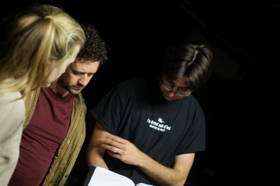
Drowned or Saved? in rehearsal
Unless you can suspend your modern sensibility enough to understand a world where you don't have that freedom to be and say what you want, it's difficult to understand what happened.
Hopefully, the play gives a little reflection about the fact that the one we have now was not a world that existed back then. We need to read history that way and recognise that we're on the same path if we're not careful.
What was the biggest challenge you met when you were writing the play?
I think one of them was my determination to know the man I was writing about and not guess beyond what I had to guess. Trying to get inside the man, the way he would speak, his thinking... I was always slightly worried it wasn't going to be enough.
Did you feel any pressure putting such a figure on stage?
I want to say yes, but only partially. I believe anyone should be able to interpret something and put their own spin on things. I don't think this should be the last play written about Levi. Someone should write a play that gives a different version of him. I think that having a discussion is more important. I feel the weight of trying not to do it wrong but I also don't want to be afraid of it. But yes, I do feel a little bit of pressure.
If you were to meet Levi, what would you ask him?
Oh, I'd love to have days and days with him. I think I would ask him if he was ever truly happy.
What do you think the answer would be?
I think he would say yes but I'd be really curious to know when and what quality he would have attributed to his happiness. So much of what we know about him is about the negative period of his life and I know he brought so much humour to people's lives. He became incredibly good at presenting himself in public. I feel like that would be the most personal question to ask.
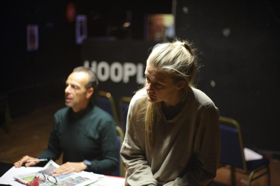
or Saved? in rehearsal
Do you think he'd like the play? Would you want him to see it?
I don't know. I have no doubt it would touch nerves with him. The way I'm trying to think about it is, would I want to see a play written about me? Even if I knew that they'd done a huge amount of work, would I want to see it? Does any of us want to see a true reflection of ourselves as people see you? I don't know if I have a clear answer to that.
Describe it in three words.
Reflective. Cathartic. Heartbreaking.
Are you going to make people cry?
I imagine so. I was going to say I hope so, but please don't write that [Sorry!] The reason I'm reticent about it is that I've avoided sentiment, but at the same time it's a difficult play. It's not an easy one to watch.
There's humour in it, obviously, but by the end you've gone through a huge amount and I think it's heartbreaking. I just hope people have a response to it and don't avoid it.
Drowned or Saved? runs at Tristan Bates Theatre 6-24 November.
Photo credit: Claudio Ravanelli
Videos
